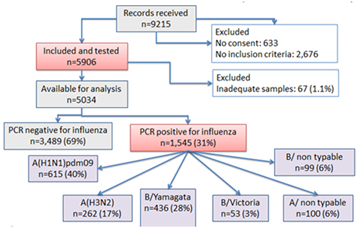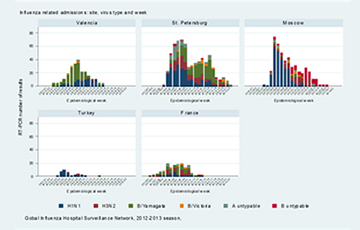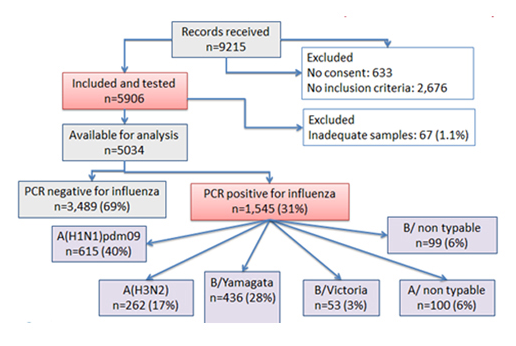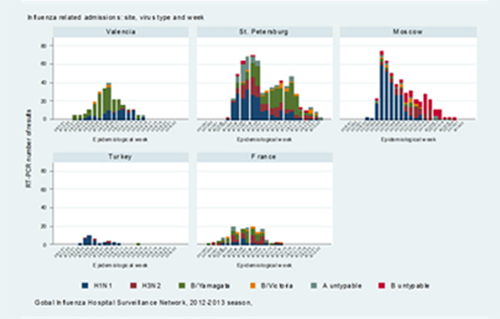30 participants from 11 countries including important experts, representatives from WHO, Bill & Melinda Gates Foundation and US CDC attended the meeting.
Summary of the 2012-2013 season results
Northern Hemisphere season
In 2012–2013, the GIHSN included 21 hospitals (5 in Spain, 5 in France, 4 in the Russian Federation, and 7 in Turkey).
It was a pilot year for Turkey.
Of 5034 ILI patients included with polymerase chain reaction results, 1545 (30.7%) were positive for influenza.
Strain circulation
Influenza A(H1N1), A(H3N2), and both B lineages co-circulated, although distributions varied greatly between coordinating sites and over time.
Two waves of influenza were observed in all sites (some even 3). In a period of 20 weeks all 3 usual influenza strains were related to admissions.
A high level of circulation of B virus was observed mainly in Spain and France. A co-circulation of both Yamagata and Victoria lineages was observed (with a majority of Yamagata lineage).
Burden of disease
All age groups were affected by influenza related hospitalization.
Main identified risk factor of an influenza related admission were obesity, pregnancy, cardiovascular disease, and immunodeficiency, increased the risk.
A(H1N1) was the most common influenza strain isolated among hospitalized adults 18–64 years of age at four of five coordinating sites, whereas.
A(H3N2) and B viruses were isolated more often than A(H1N1) in adults ≥65 years of age at all five coordinating sites.
A(H1N1) was rare in those over 75.
B influenza morbidity is significant and B influenza can lead to a large number of hospitalization in adult and elderly.
A total of 16 deaths and 20 intensive care unit admissions were recorded among patients with influenza. In Spain and France 2% and ~3% of patients positive for influenza died in hospital.
Vaccine effectiveness
Vaccine overall reduce by 1/3 the chance of getting hospitalized for flu related condition.
The vaccine was more effective against B strain (reduced by about half of the hospitalization)
Publications 2012-2013
First Year Results of the Global Influenza Hospital Surveillance Network: 2012-2013 Northern hemisphere Influenza Season.
BMC Public Health 2014, 14:564
2012-2013 Seasonal Influenza Vaccine Effectiveness against Influenza Hospitalizations: Results from the Global Influenza Hospital Surveillance Network.
PLoS ONE 9(6): e100497. doi:10.1371/journal.pone.0100497
www.plosone.org/article/info%3Adoi%2F10.1371%2Fjournal.pone.0100497






Comments are closed.